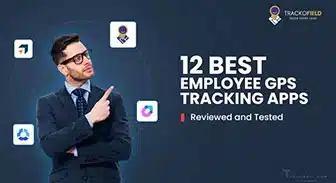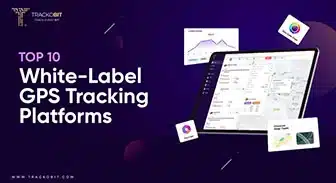-
TrackoBit
Manage commercial vehicles with the new-age Fleet Management Software
TrackoBit -
TrackoField
Streamline your scattered workforce with Field Force Management Software
TrackoField -
Features Resources
-
Blog
Carefully curated articles to update you on industrial trends. -
White Paper
Insightful papers and analysis on essential subject matters. -
Glossary
Explore an alphabetical list of relevant industry terms. -
What’s New
Get TrackoBit & TrackoField monthly updates here. -
Case Study
Explore the cases we solved with our diverse solutions. -
Comparisons
Compare platforms, features, and pricing to find your best fit.
-
About Us
Get to know TrackoBit: our team, ethos, values, and vision. -
Careers
Join the most dynamic cult of coders, creatives and changemakers. -
Tech Support
Learn about our technical support team and services in detail. -
Events
Check out the exhibitions where we left our marks and conquered. -
Contact Us
Connect with us and let us know how we can be of service.
Advantages and Disadvantages of GPS Tracking Software
- Author:Ayushi Nagalia
- Read Time:8 min
- Published:
- Last Update: December 23, 2025
Table of Contents
Toggle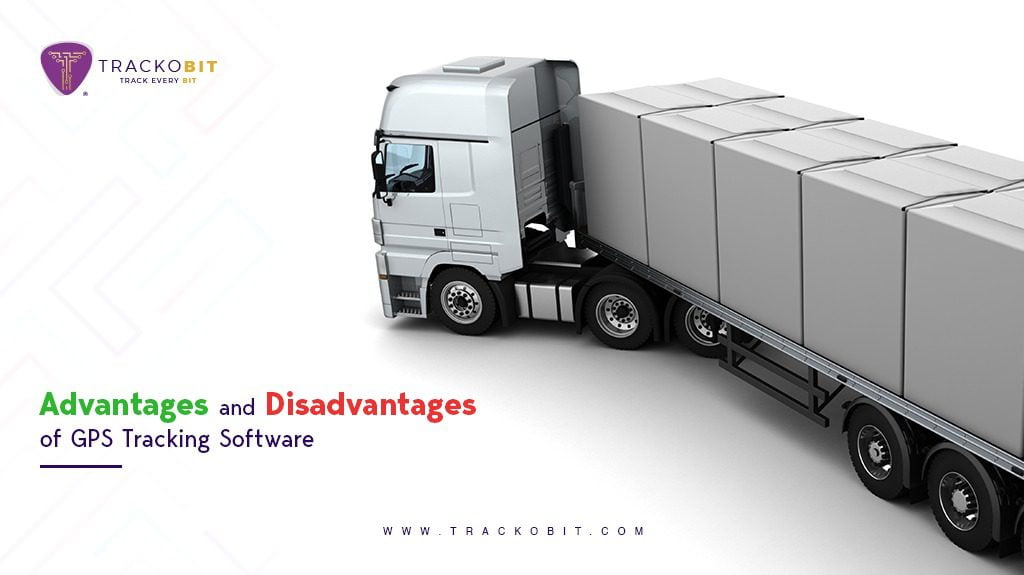
What good is a fleet of vehicles if instead of gaining profits it incurs losses? After all, without proper GPS tracking systems and decent management, companies risk losing 55% of their productivity and profitability.
Table of Contents
Toggle
GPS technology has been around since the early 1960s. However, it was not until the late 1970s that early-age GPS tracking systems were used in vehicles. The best part? The world has never looked back since and for good reason!
How Does GPS Tracking Software Work?
Global Positioning System (GPS) systems have been around for a while. While the application might have advanced and changed throughout the years, the way GPS tracking works has remained the same.
For GPS tracking systems to work, they need a strong Global Navigation Satellite System (GNSS) network. This constellation of satellites emits electromagnetic signals to GPS devices that are installed in whatever needs to be tracked.
This signal data between satellites and GPS devices are shared with GPS servers that decipher the devices’ exact location. Further, this information is passed on to GPS tracking software that presents digestible data to customers.
In short, this is how the tracking process looks:
-
-
- GPS devices receive signals from satellites from GNSS
- Satellites share the time and distance covered by the signals to reach devices to the GPS servers
- Servers churn this information to decipher the vehicle’s exact location
- Through mobile networks, This information is shared with GPS tracking software
- The software presents a palatable amount of information in an easy format to the client
-
Looks like a long process, right? Well, keep in mind that all this is done within seconds – that is some out-of-the-world speed for outer-space communication!
What is GPS Tracking in Fleet Management Software?
In the general definition of things, GPS tracking systems track the devices, animals, assets, or whatever they are planted on. As long as the GPS device is connected to the subject and has a strong network, its location is supervisable.
In the early times, GPS tracking systems for fleet management were used to only keep tabs on the vehicles’ location. In a world where if something left your sight, its whereabouts couldn’t be figured, seeing vehicles as dots on a map was enough.
However, as time and technology advanced, so did GPS tracking. With IoT sensors and software-based analytical tools in place, GPS software for fleets can now do things such as
- Control idling time,
- Get maximum revenues,
- Monitor fuel,
- Supervise drivers,
- Regulate safety features, and more
In fact, GPS tracking has now evolved into full-fledged fleet management software and telematics software systems. These systems and solutions use the technology and much more to perform fleet business-centric functions.
Get A Help From Our Experts
Advantages of GPS Tracking Software
GPS technology has had a multitude of benefits through the ages. However, in fleet management, no monitoring and strategizing measure would have been possible without locational tracking. Therefore, here, let us look into some of the obvious advantages of GPS tracking software for vehicle management.
- Live Locational Tracking: The primary function of locational tracking also becomes a major advantage for GPS tracking systems. Knowing a vehicle’s location increases safety, security, communication, operational chain, and even budgeting.
- IoT Sensor Integration: Fuel level monitors, tire pressure monitors, dashcams, and odometers make the world of a difference in the kind of information managers receive. And, the more relevant the information they have, the better will be their strategies.
- Advanced Reporting: With extra data collection, the software can create advanced reports. These reports ultimately show managers the bigger picture of operations in their fleet, allowing them to be in total control.
- Better Security Measures: When managers are aware of where their vehicles are, there is a higher possibility of them being able to keep vehicles and drivers safe. With that, also come consignment safety, better goodwill for the company, and fleet maintenance cost reduction.
- Geofencing: Geofencing is a powerful function in fleet management through GPS tracking. Geofencing can be used for multiple functions, such as route planning, making safe areas, etc.
- Automated Operations: Fleet management systems add a layer of automation when it comes to manual work such as maintaining files and repeatedly determining routes and fleet budgets. This saves the business a lot of time and resources.
- Low Operational Costs: Functions such as fuel monitoring and route management definitely make operation costs go down significantly.
- Increased Profitability: With lower operational costs come higher profits. Moreover, fleet management systems are one-time investments that come with life-long benefits.
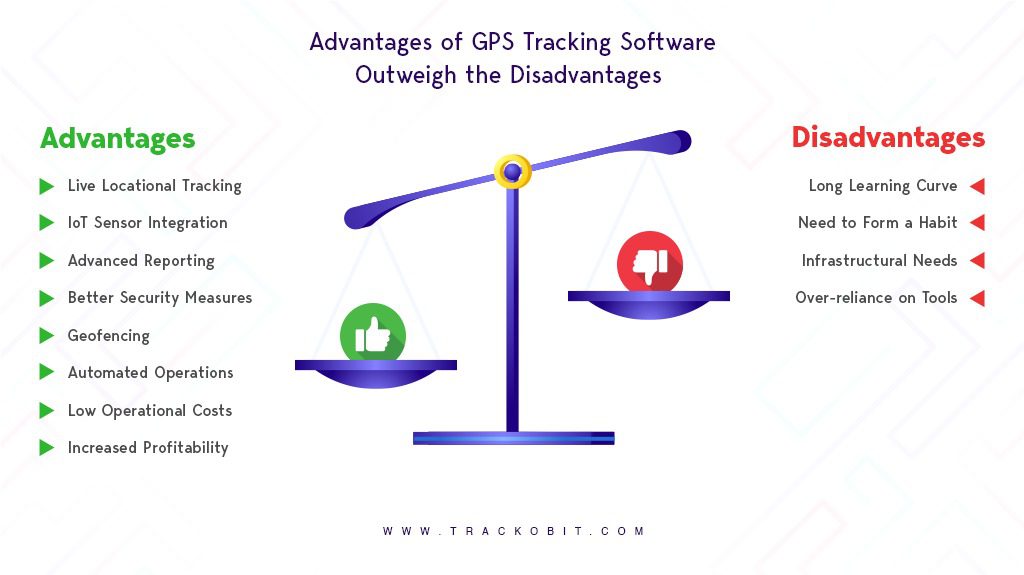
Disadvantages of GPS Tracking Software
Not everything that looks green is grass. Similarly, if a solution has benefits for your organization doesn’t mean that it cannot be detrimental alongside. GPS tracking does have some disadvantages for fleet management. Let us look into them here.
- Long Learning Curve: Due to the massive number of functions that GPS tracking systems now offer, managers might take time to get used to the software. The learning curve involved ultimately provides benefits but takes long enough to keep them from performing some of their jobs.
- Need to Form a Habit: Managers might get acquainted with the functions of the software, but how they use it is important too. Most managers only track vehicles and leave aside the other functions, making the subscription cost essentially go to waste.
- Infrastructural Needs: Some fleet businesses might not focus much on their network infrastructure. Therefore, it becomes impossible for them to reach out to vehicles without lag. While this is not a costly thing to bear for your fleet, it is an added responsibility.
- Over-reliance on Tools: An age issue with technical advancement is people getting over-reliant on technology. Most human functions are either taken over or lose significance if technology ceases to exist or suddenly becomes inaccessible. This reliance hinders fleet functions at times of emergency such as network cuts or blackouts. Moreover, technology can also be prone to faults, expensive ones.
Why Use Fleet Management Software?
From the above two sections, you must have understood that the advantages of GPS tracking software surpass their disadvantages. After all, without GPS, no fleet management system can possibly exist.
However, moving past the realm of tracking dots on maps, you might want to track your fleet holistically. Using fleet management software with a GPS tracking solution makes sense because of these functions it serves over tracking:
- Fuel Management: Through fuel sensors, fleet managers can define when and how much fuel is filled and ejected into the tank. Therefore, being able to monitor and control one of the most expensive parts of fleet management can increase profitability and functionality. This function also helps in pilferage prevention.
- Route Planning: Route planning or trip management allows managers to choose set paths for vehicles through software. Through these GPS-aided routes, they can help the fleet save time, money, and resources.
- Driver Monitoring: Whether or not the people who have the most responsibility in your fleet are acting responsibly makes a massive difference. Driver behaviour monitoring might include things such as route deviating alerts, harsh braking and acceleration reports, and overspeeding limits.
- Asset Tracking: Asset tracking is mostly aided by GPS tracking by keeping a look at the asset’s location. For assets and consignments in transit, these systems can also offer ETAs, PODs, etc.
- Video Telematics: With Video telematics and its functions such as DMS and ADAS, fleets can be safer than ever through the complete view of the fleet, vehicle, driver, road, and much more.
How to Choose the Ideal GPS Tracking Software for Your Fleet?
Each fleet has unique requirements owing to the industry they serve. Therefore, the best-rated software out there might not work for everyone. If you want to avoid choosing a GPS tracking system which is good, but not ideal for your fleet, you must keep the following things in mind.
- Fleet Requirements: Waste management fleets need proper route planning while construction fleets require high-level engine health monitoring. Every industry that needs fleets has separate priorities. Therefore, you must look at your fleet’s functional priority and then choose your software accordingly.
- Business Budget: Obviously, the more budget your fleet has, the more advances your software you can afford. Always keep the fleet’s budget in mind. After all, if the tool that helps reduce costs itself increases costs massively, what’s the point?
- Branding Needs: Do you sell hardware and offer a complete package with software? In that case, do you want customers to see your hardware business’ logo or are okay with them seeing who your software provider is? If you want the former, you’d need white label solutions.
- Fleet Resources to Use: You might have a large budget but do not have enough people on board to dedicatedly strategize routes – even with software aid. In that case, there is no point in investing in heavy software just for the sake of it.
- Your Scaling Plans: While getting your Best GPS tracking software you should see where you visualize your business to be in the next few years. If you see your business boosting at a rate of 50%, why save money and invest in software that will help you scale only 20% and then spend the same money later?
Summing Up
What does not have unique pros and cons? It is the way you work with them that will decide how your fleet functions. In the modern world, whether or not you leverage advancing technology determines your standing in the market.
If you are looking for some of the top GPS tracking solutions and fleet management software, you should contact TrackoBit. With exceptional flexibility and innovation, no matter what your fleet will need, we’ll provide it for you!
Looking for some of the top GPS tracking solutions and fleet management systems
FAQs
-
How much cost savings can I expect from implementing GPS tracking software?
Implementing GPS tracking software can lead to significant cost savings. It is typically in the range of 10–25% on fuel, vehicle maintenance, and operational inefficiencies. Savings come from optimized routes, reduced idle time, and improved driver behavior. Actual results depend on fleet size, type of operations, and existing challenges.
-
Can GPS tracking software work in areas with poor network connectivity?
Yes. Modern GPS tracking software like TrackoField can store location and activity data offline and sync automatically once network connectivity is restored. This helps in ensuring continuous tracking even in low-connectivity areas.
Ayushi Nagalia is a Senior Content Specialist at TrackoBit. She is a marketing maverick with a lush background in literature. With years of experience crafting content for various niches, she speciali... Read More
Related Blogs
-
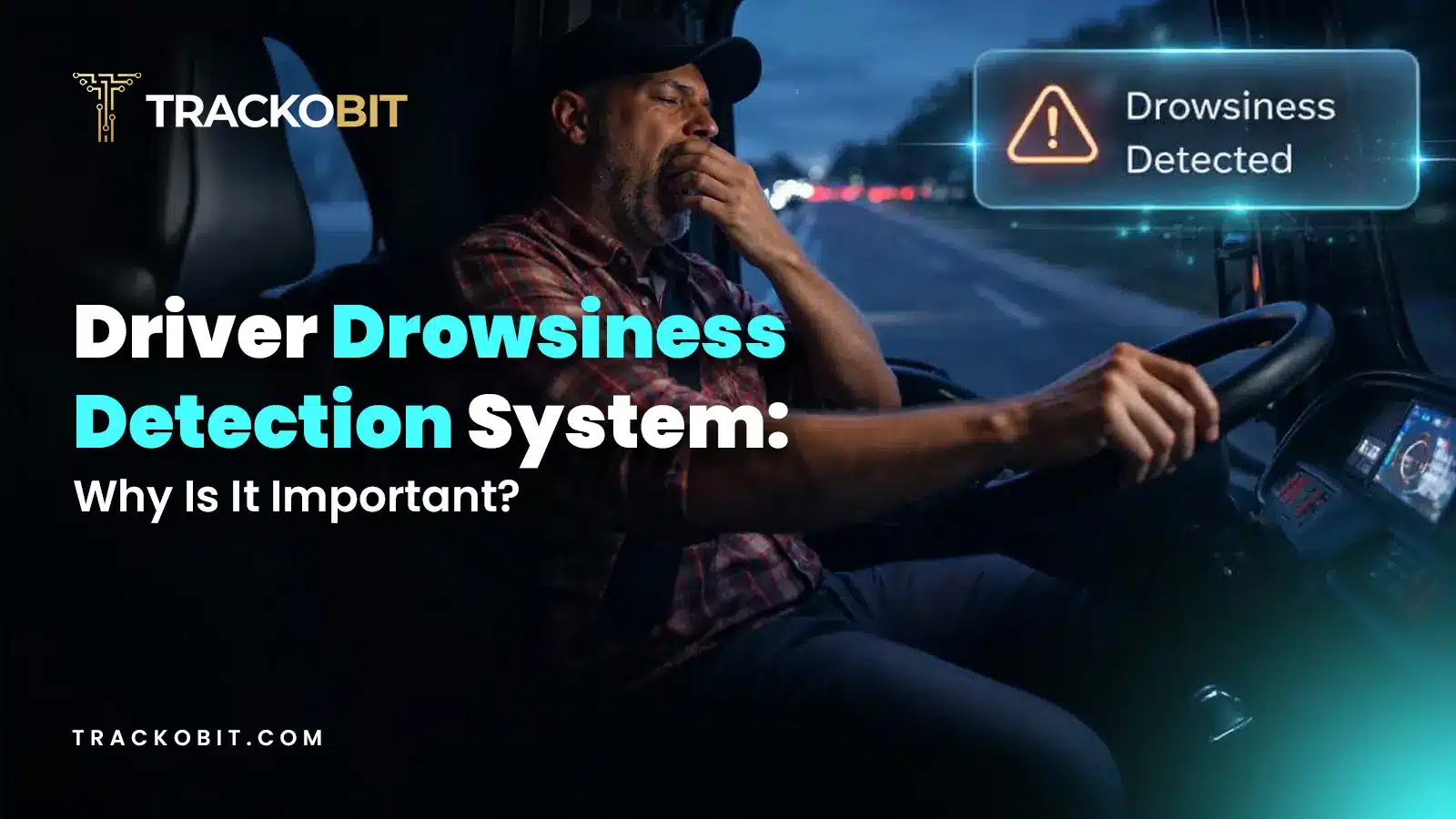
Why is Driver Drowsiness Detection System Important for Fleet Management?
Shemanti Ghosh February 4, 2026A driver drowsiness detection system is critical for fleet management. It helps prevent fatigue-related accidents and reduces operational risks through…
-
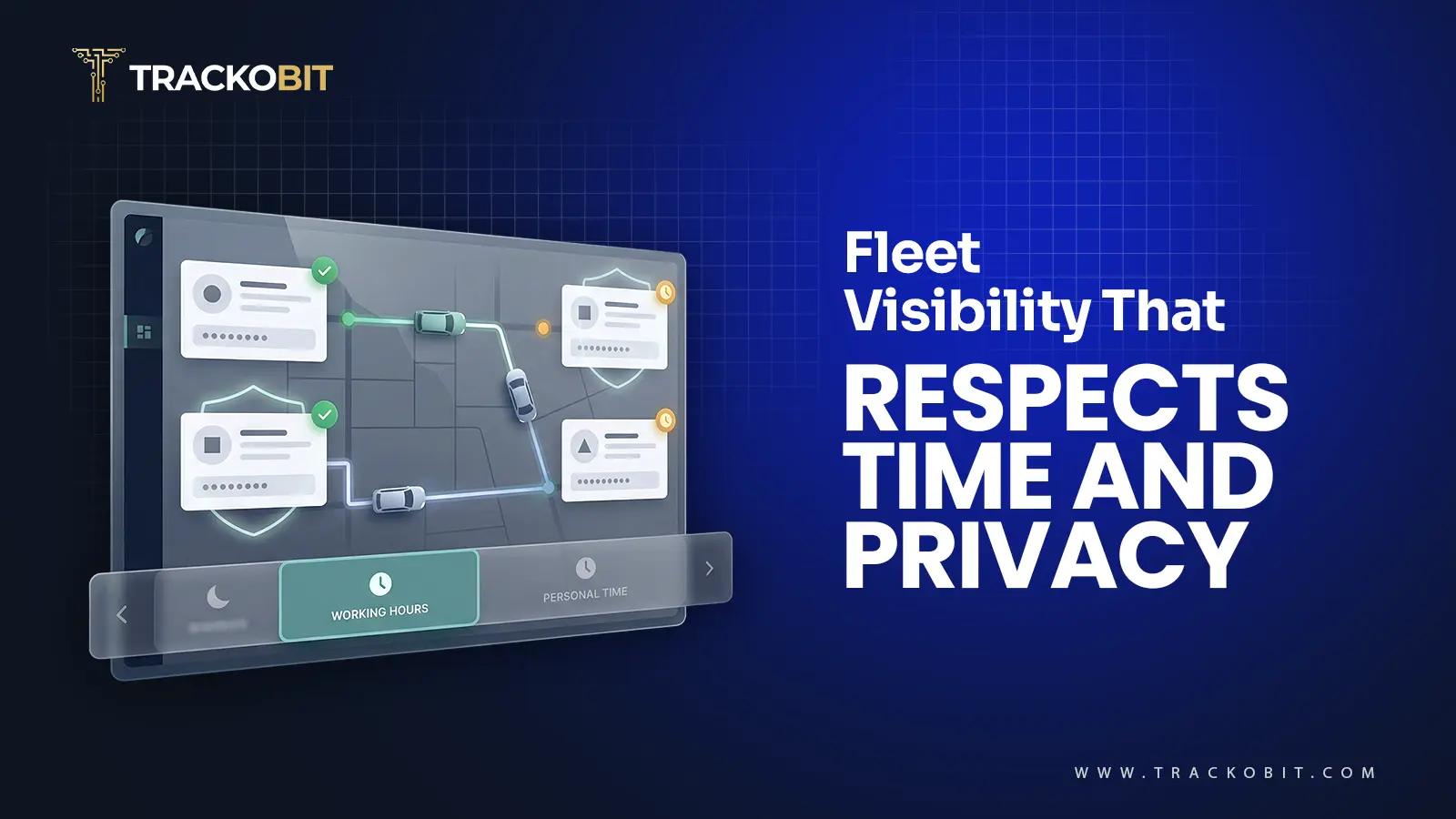
When Tracking Needs a Clock: Rethinking Fleet Visibility
Tithi Agarwal December 24, 2025Read on to understand why fleet tracking works better when it follows working hours. Because visibility should support operations, not…
-
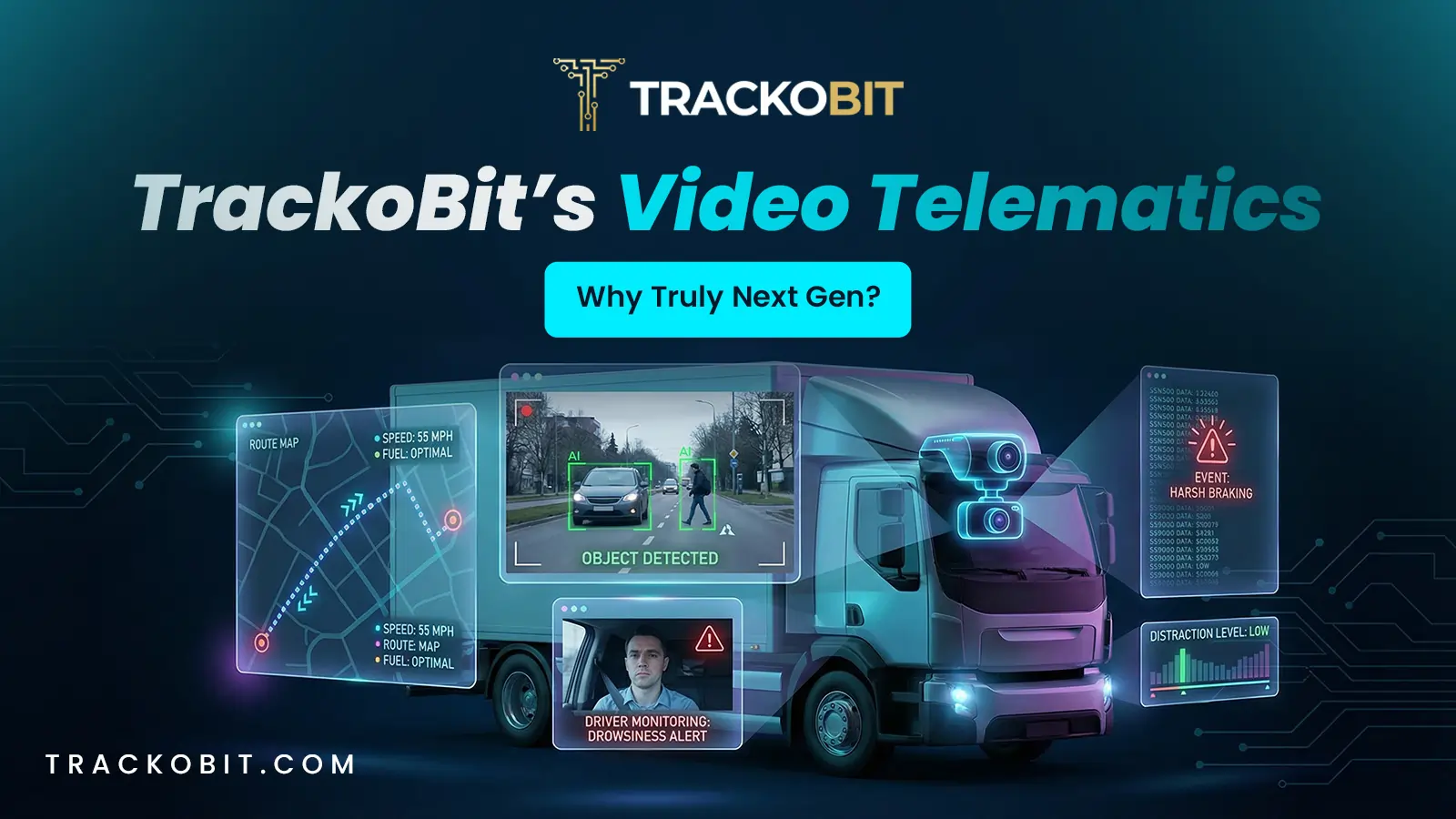
What Makes TrackoBit’s Video Telematics Software Truly Next-Gen?
Shemanti Ghosh December 17, 2025TrackoBit’s video telematics software blends smart video intelligence with full server control. The result? Superior fleet reliability and safety.
-
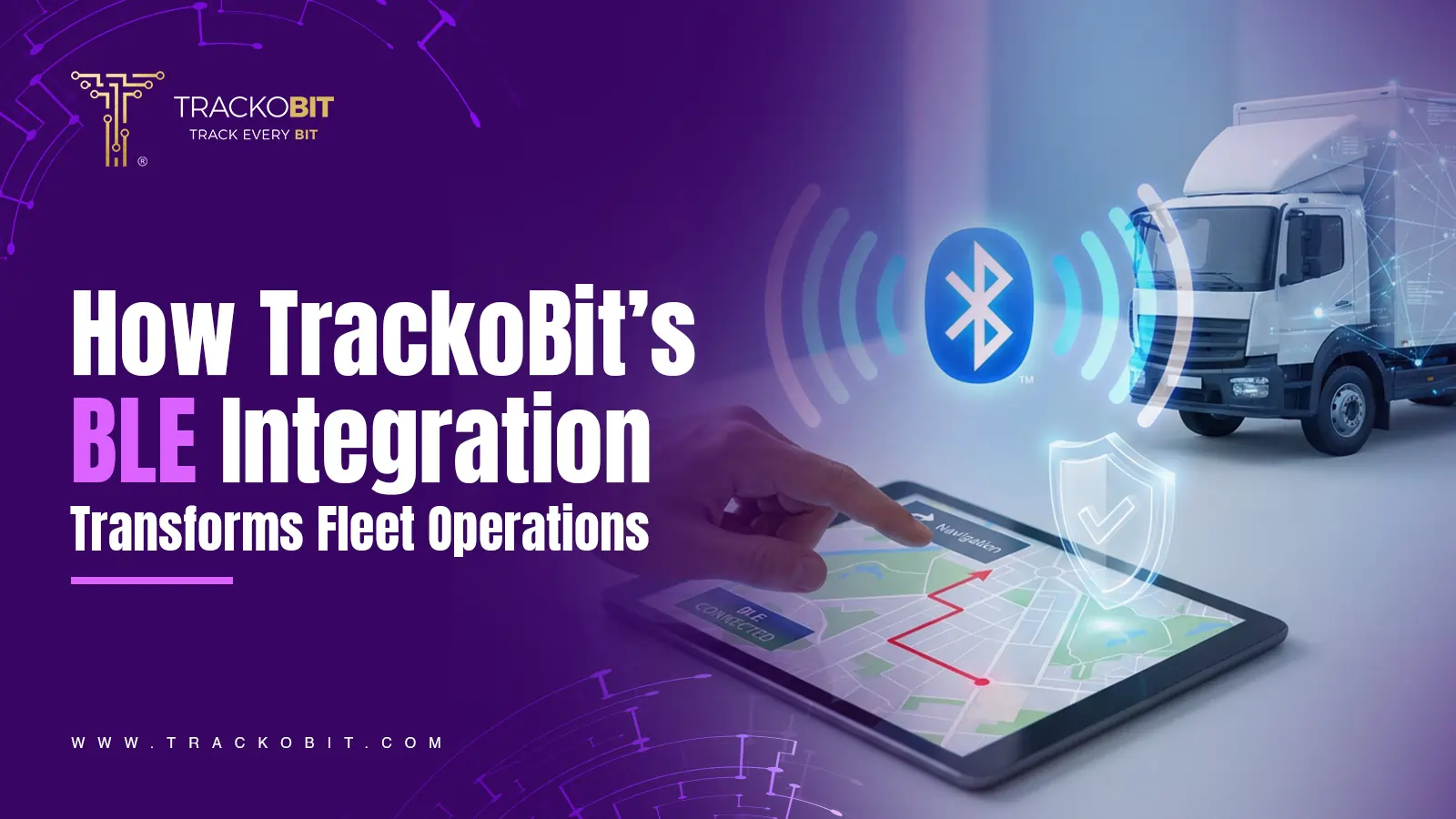
Plug, Pair, Perform TrackoBit Introduces BLE Sensor Integration
Tithi Agarwal November 26, 2025TrackoBit’s BLE Sensor Integration enables wireless, real-time monitoring with faster installs and accurate insights. It improves fleet efficiency, visibility, and…

Subscribe for weekly tips to optimize your fleet’s potential!
Your inbox awaits a welcome email. Stay tuned for the latest blog updates & expert insights.
"While you're here, dive into some more reads or grab quick bites from our social platforms!"Stay Updated on tech, telematics and mobility. Don't miss out on the latest in the industry.
We use cookies to enhance and personalize your browsing experience. By continuing to use our website, you agree to our Privacy Policy.


































